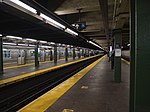Simpson Street station
1904 establishments in New York CityAccessible New York City Subway stationsIRT White Plains Road Line stationsLongwood, BronxNational Register of Historic Places in the Bronx ... and 5 more
New York City Subway stations in the BronxNew York City Subway stations located abovegroundRailway and subway stations on the National Register of Historic Places in New York CityRailway stations in the United States opened in 1904Source attribution

The Simpson Street station is a local station on the IRT White Plains Road Line of the New York City Subway. Located at the intersection of Simpson Street and Westchester Avenue in the Longwood neighborhood of the Bronx, it is served by the 2 train at all times, and the 5 train at all times except late nights and rush hours in the peak direction.
Excerpt from the Wikipedia article Simpson Street station (License: CC BY-SA 3.0, Authors, Images).Simpson Street station
Simpson Street, New York The Bronx
Geographical coordinates (GPS) Address Nearby Places Show on map
Geographical coordinates (GPS)
| Latitude | Longitude |
|---|---|
| N 40.824 ° | E -73.893 ° |
Address
Simpson Street
Simpson Street
10459 New York, The Bronx
New York, United States
Open on Google Maps







